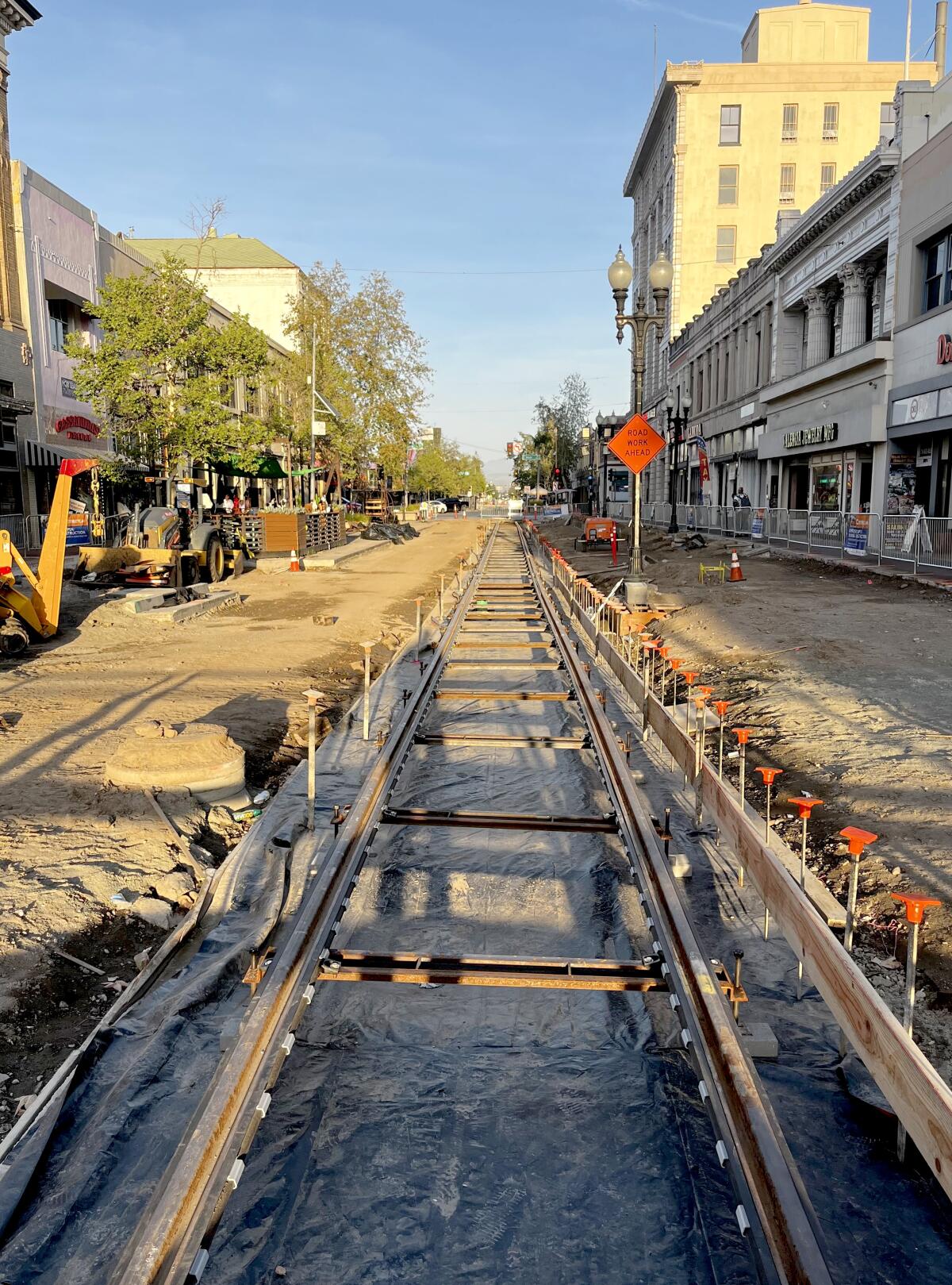Downtown Santa Ana businesses push OCTA for funds amid streetcar construction

- Share via
Merchants reeling from OC Streetcar construction along 4th Street in downtown Santa Ana accused the Orange County Transportation Authority of railroading their businesses into the ground during a contentious Board of Directors meeting this week.
The OCTA boardroom in Orange became the latest venue for the airing of such grievances, including claims of blatant discrimination, since segments of the historic thoroughfare closed Jan. 31 for construction of the $509.5-million urban railway project.
“I ask myself why you didn’t plan this project in Tustin or Irvine,” said Guadalupe Barragan in Spanish on behalf of Charlie’s Tattoo Supplies. “You are exploiting Mexicans because these businesses on 4th Street are Mexican.”
The meeting followed protests at the construction site and pleas for help before Santa Ana City Council.
Merchants from the predominantly Latino commercial district pressed board members to do more by providing direct payments to businesses in addition to improving signage and security around the area.
Ryan Chase, president of Downtown Inc., noted his support of the streetcar but also backed his tenants in their call. The Chase family is the largest property owner in downtown Santa Ana.
“We had to give numerous rental reductions and discounts to help our tenants survive,” Chase said. “Just for reference, most businesses are down between 30 to 70% and, obviously, that’s not sustainable no matter what business you have.”
In February 2020, the board approved $400,000 for “Eat, Shop, Play” marketing and promotional funds through Downtown Inc. and the Santa Ana Business Council, the two booster nonprofits.
At a board meeting last month, the question of direct assistance to businesses arose. The agency came back this week after reviewing nine similar rail construction projects across the nation with business interruption funds in mind.
Most didn’t offer direct assistance, but two did, including the Los Angeles County Metropolitan Transportation Authority, which just wrapped up pilot programs that helped small businesses during the multiyear construction of the 8.5-mile Crenshaw/LAX line.
L.A. Metro established a Business Interruption Fund in 2014 for several transit rail construction projects. It provided more than $20.1 million for 230 small businesses impacted by the Crenshaw/LAX line.
But OCTA proved hesitant in emulating its neighbor to the north.
As the fate of the controversial Angel Stadium deal hangs in the balance, affordable housing elsewhere in the once vaunted area is nowhere to be seen.
The agency reached out to the Federal Transit Administration, which confirmed that federal funds for the OC Streetcar project couldn’t be used for direct payments to impacted businesses.
That left the question of OCTA’s own $1.3-billion budget, which hasn’t been used in the past to provide aid.
And with a cautious eye toward direct relief to private businesses being interpreted as a “gift of public funds” under the state’s constitution, OCTA didn’t seem to be poised to do so starting with the streetcar.
“Are there exceptions?” asked Katrina Foley, a board member and current county supervisor for District 2, which includes Santa Ana.
“There are exceptions,” said James Donich, general counsel for OCTA. “It goes under what’s called the ‘public purpose doctrine.’ Could we say there is a public purpose here? Potentially.”
But Donich cited state Supreme Court case precedent in arguing that OCTA wasn’t formed to support downtown Santa Ana businesses and that even under transit considerations, such funds could only incidentally benefit “non-state entities” through a well-established public purpose.
Santa Ana created its own $1.5-million Business Interruption Fund with qualifying businesses along 4th Street being eligible for up to $10,000 in assistance.
City Council also directed staff to explore an appropriation of the same amount, a follow-up that hasn’t returned before the dais yet.
In the meantime, $509,000 in relief funds has already been paid to 71 impacted businesses. The city received 117 applications total and has 35 pending payments that will bring payouts up to $836,500.
The city has also subsidized free parking at its garage, including two hours on weekends. According to Mayor Vicente Sarmiento, who also sits on the OCTA board, the move has cost Santa Ana $800,000 in projected parking garage revenue, so far.
“It’s an all hands on deck moment,” Sarmiento said. “If we all did something, these businesses will survive.”
For board member Don Wagner, the only solution to the streetcar saga was to pump the brakes on the project and save $190 million.
“Let’s just stop,” he said. “That’s the way we solve this problem.”
Wagner didn’t clarify how much time and money would be spent repairing 4th Street from construction already carried out, but he also wanted allegations of racial discrimination to come to a halt.
“The suggestion that there is something that is being done to Santa Ana that wouldn’t have been done to other communities if they had a different demographic is absolutely outrageous and absolutely false,” he said.
Board members wrapped up discussion with a vote to continue working with Santa Ana, downtown merchants and other stakeholders on mitigation efforts.
In that, Foley requested that the agency consult with the state Attorney General’s office on exploring the question as to whether grants could be legally provided to businesses.
For some business owners, help can’t come soon enough.
Dana Jazayeri, the owner of Unlisted, a home goods retail store inside 4th Street Market, reported a 40% decline in sales to the board.
“I’m actually faring worse than during COVID shutdowns,” he said. “If we cannot survive this phase of the project to reap the benefits you speak of once completed, you’ll build the streetcar upon our ashes.”
All the latest on Orange County from Orange County.
Get our free TimesOC newsletter.
You may occasionally receive promotional content from the Daily Pilot.





